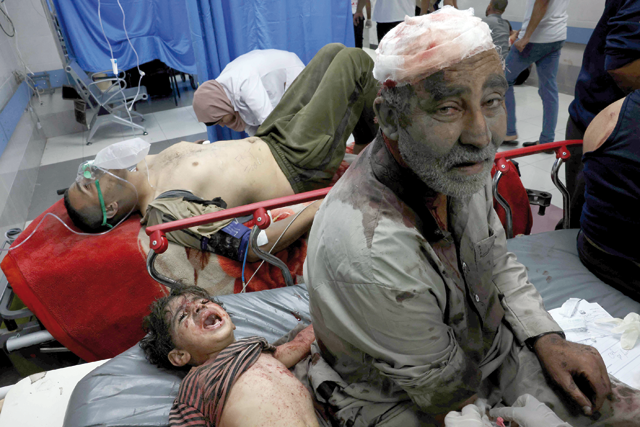You are here
Israel forms emergency gov't for duration of war against Hamas
By AFP - Oct 12,2023 - Last updated at Oct 12,2023

Wounded Palestinians wait for treatment at the overcrowded emergency ward of Al Shifa Hospital in Gaza City following an Israeli air strike on Wednesday (AFP photo by Mohammed Abed)
OCCUPIED JERUSALEM — Israel on Wednesday kept up its bombardment of Hamas targets in the Gaza Strip, as prime minister Benjamin Netanyahu and a political rival announced an emergency government for the duration of the conflict that has already killed thousands.
The veteran right-wing leader was joined by the centrist Benny Gantz, a former defence minister, in the government and war cabinet as both put aside bitter political divisions that have roiled the country and sparked mass protests.
Gaza officials reported more than 1,000 people killed in Israel's withering campaign of air and artillery strikes on the crowded Palestinian enclave, where black smoke billowed into the sky and entire city blocks lay in ruins.
Israel has massed forces, tanks and other heavy armour around Gaza in its retaliatory operation.
US President Joe Biden has pledged to send more munitions and military hardware to its close ally Israel.
Amid the crisis that has been labelled "Israel's 9/11", Netanyahu struck the political deal with Gantz and pledged to freeze for now his government's flashpoint judicial overhaul plan that has sparked an unprecedented wave of mass protests since the start of the year.
Netanyahu’s extreme-right and ultra-Orthodox Jewish allies will remain in government, however.
Opposition leader Yair Lapid has not joined the temporary alliance, although the joint statement said a seat would be “reserved” for him in the war Cabinet.
Fears for hostages
As the war has raged, fears have been intense in Israel for the fate of at least 150 hostages — mostly Israelis but also including foreign and dual nationals — being held in Gaza by Hamas.
The militant group has claimed that four of the captives died in Israeli strikes and has threatened to kill other hostages if civilian targets are bombed without advance warning from Israel.
Concern has mounted over the worsening humanitarian crisis in war-torn Gaza, where Israel had levelled over 1,000 buildings and imposed a total siege, cutting off water, food and energy supplies for 2.3 million people.
The enclave’s sole power plant shut down Wednesday after running out of fuel, Gaza’s electricity provider said.
More than 260,000 Gaza residents have been forced from their homes, a UN aid agency said, while the European Union called for a “humanitarian corridor” to allow civilians to flee the enclave’s fifth war in 15 years.
Israel appeared to be readying for a possible ground invasion of Gaza, but faces the threat of a multifront war after also coming under rocket attack from militant groups in neighbouring Lebanon and Syria.
Israel again struck targets on Wednesday in southern Lebanon, an area controlled by Hezbollah, an ally of Israel’s arch enemy Iran.
On Wednesday evening, rocket sirens sounded across Israel’s north, and the army said there was a suspected aerial “infiltration” from Lebanon.
Biden, who has diverted an aircraft carrier battle group to the eastern Mediterranean, issued a stern warning to Israel’s foes: “To any country, any organisation, anyone thinking of taking advantage of this situation, I have one word: Don’t.”
‘Staggering’ death toll
Israel has been badly shaken by the deadliest attack since its creation in 1948 and the intelligence failure that allowed more than 1,500 militants to storm through the Gaza security barrier in their coordinated land, air and sea attack.
Troops have encountered and killed several holdout Hamas fighters, said Israeli military spokesman Daniel Hagari .
The Israeli army has called up 300,000 reservists for what Netanyahu has said will be a “long and difficult” war.
‘In a ghost town’
Heavy bombardment again rained down on Gaza, where the sky was blackened and Hamas said at least 30 people were killed in overnight strikes.
Rubble, burnt out cars and broken glass covered roads in Gaza City, where bombs struck the Hamas-linked Islamic University. Also targeted were residential buildings, mosques, factories and shops, said Salama Marouf of the Gaza government’s media office.
One Gaza resident, Mazen Mohammad, 38, said his terrified family had spent the night huddled together as explosions shook the area, before emerging in the morning to assess the total devastation of their neighbourhood.
“We felt like we were in a ghost town, as if we were the only survivors,” Mohammad told AFP.
Medical supplies, including oxygen, were running low at Gaza’s overwhelmed Al Shifa hospital, said emergency room physician Mohammed Ghonim.
Unrest has flared in the occupied West Bank, where protests have been held in solidarity with Gaza and 27 Palestinians have been killed in clashes since Saturday.
“My entire life, I have seen Israel kill us, confiscate our lands and arrest our children,” said Ramallah coffee vendor Farah Al Saadi, 52, who praised the Hamas assault.
Israeli cities have been eerily quiet and tense, with some residents noting a growing sense of fear and distrust between Jews and members of the Arab-Israeli minority.
Frantic diplomacy has continued as international and regional powers sought to prevent a wider conflagration in the Middle East.
Turkey’s President Recep Tayyip Erdogan accused Israel of “shameful methods” including “bombing civilian sites, killing civilians, blocking humanitarian aid”.
Related Articles
OCCUPIED JERUSALEM — A key member of Israel's war Cabinet quit prime minister Benjamin Netanyahu's government on Sunday, heaping domestic pr
GENEVA — The International Committee of the Red Cross (ICRC) is in contact with Hamas and Israel to try to negotiate the release of hostages
Israeli air strikes pounded Gaza Sunday, killing at least a dozen people, after Prime Minister Benjamin Netanyahu warned the bloody offensive would continue as long as necessary.












